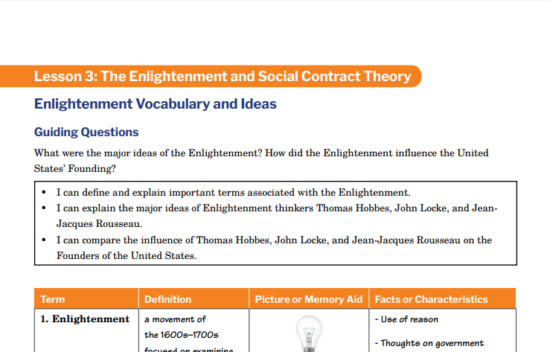Lesson Components
Facilitation Notes: For students who need additional scaffolding in vocabulary and reading comprehension, this lesson plan suggests completing the “Stranded!” story as preparatory work along with the essay and accompanying organizer in class. Stronger readers can complete the essay and accompanying organizer for homework and begin class with the “Stranded!” story. If time or reading level is a concern, use the starred* quotes in the Enlightenment Thinker Quotations activity. Students will consult Appendix A: Founding Principles and Civic Virtues Organizer and Appendix B: Being an American Unit Graphic Organizer from the first lesson in this curriculum.
Expand Prework
Anticipate
Expand Warmup
Engage
Allow students 5 minutes to discuss their answers to the background/preparatory work scenario with a partner or in small groups, as best fits your classroom. When time has passed, ask students to share their responses with the class. Encourage students to explain their reasoning as they share.
Expand Activities
Activities
Explore
- Distribute Background Essay to students. Tell students that the questions they wrestled with are very similar to those that Enlightenment thinkers such as Thomas Hobbes, John Locke, and Jean-Jacques Rousseau grappled with centuries ago. Their arguments would go on to influence the Founding generation that established the government of the United States. Before reading the essay, students should preview the vocabulary in the graphic organizer. Have students scan through the essay and highlight the terms from the list. Tell them that as they encounter a term, they should complete the graphic organizer. Read the essay aloud as a class or have students read individually. After reading, give students time to complete the three concluding questions. Lead a brief discussion on the answers.
- Distribute Enlightenment Thinker Quotations. The first quote has been completed as an example. Have students complete the handout individually, in pairs, or as a class, as best fits your classroom.
- After completing the quote activity, ask students to select the quote they think most influenced the Preamble of the Declaration of Independence or the one they most connected with. Have them share this quote and their reaction first with a partner, then in groups of four. Have the groups of four come to a consensus about which quote most influenced the Preamble or which they all most connected with. Have groups share out their consensus and reasoning.
Expand Wrap Up
Assess & Reflect
- Have students return to Appendix A: Founding Principles and Civic Virtues Organizer from the first lesson in this curriculum and complete the definitions of natural/inalienable rights and limited government based on what they learned in this activity.
- Have students return to Appendix B: Being an American Unit Graphic Organizer from the first lesson in this curriculum and complete the applicable row as an exit ticket.
Expand Extensions
Extensions
Extend
- Have students write an imagined conversation or social media exchange between a philosopher of their choice (Hobbes, Locke, Rousseau) and a modern-day figure.
- Have students use the thinkers’ ideas on human nature and the nature of government as a guide to develop a concept for a school based on the philosophy of Hobbes, Locke, or Rousseau. Once completed, have students present their concept to the class. Each school should include a name, a mission statement, three policies or rules, and three courses (title and description) that connect to the thinker’s main ideas.
| Grade Level | 8, 9, 10, 11, 12 |
|---|
| Topic | Social Reform Movement, Inventions and Science |
|---|
Student Handouts
Background Essay: The Enlightenment and Social Contract Theory
“Stranded!”: A Short Story
Enlightenment Vocabulary and Ideas
Enlightenment Thinker Quotations
The Declaration of Independence
The Declaration of Independence
Related Resources
Previous slide
 humans were rational beings" width="550" height="352" />
humans were rational beings" width="550" height="352" />
Essay
Background Essay: The Enlightenment and Social Contract Theory
1689 Words

Activity
Enlightenment Vocabulary and Ideas

Activity
Enlightenment Thinker Quotations

Lesson
The Enlightenment and Social Contract Theory
4 Activities
What were the major ideas of the Enlightenment? How did the Enlightenment influence the United States’ Founding?

Educator Resource
Answer Key: The Enlightenment and Social Contract Theory

Video icon
Thomas Kidd: Benjamin Franklin and Enlightenment | BRI Scholar Talks
BRI Senior Teaching Fellow Tony Williams will sit down with historian and author Thomas Kidd to discuss his fascinating essay on the American Enlightenment and Benjamin Franklin in our new digital history textbook, Life, Liberty, and the Pursuit of Happiness. Kidd touches on everything from Franklin’s impressive printing and scientific exploits to his nuanced views on education, religion, and civic virtue. He also explains the ways Franklin used his determination to educate himself and others against the vibrant backdrop of the American Enlightenment.

Video icon
Tenth Period | What Do We Owe Each Other? Social Contract Theory from Past to Present
Join Rachel Davison Humphries, Kirk Higgins, and Professor Jeffry Morrison, Professor of American Studies at Christopher Newport University in Newport News, Virginia, as they discuss the importance of social contract theory.

 humans were rational beings" width="550" height="352" />
humans were rational beings" width="550" height="352" /> humans were rational beings" width="550" height="352" />
humans were rational beings" width="550" height="352" />




